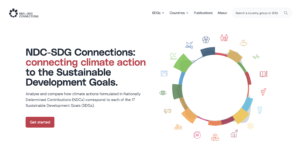Without mitigating climate change, the achievement of the 17 Sustainable Development Goals of the 2030 Agenda is at risk. At the same time, and if adequately designed, climate action can directly contribute to sustainable development.
The NDC-SDG Connections online data visualisation, jointly developed by the German Institute of Development and Sustainability (IDOS) and Stockholm Environment Institute (SEI), visually maps the links between the Nationally determined contributions under the Paris Climate Agreement (NDCs) and the Sustainable Development Goals of the 2030 Agenda (SDGS). The latest update of the online application includes 63 updated NDCs into the analysis and allows for a comparison of the NDC-SDG connections over time. More updated NDCs will be continuously added.
“Progress on the climate and sustainable development goals has stagnated and, in some cases, even decreased over the past three years. This raises questions about political will and commitment to implement both agendas. The NDC-SDG Connections show both the low-hanging fruits and the gaps that need to be filled. It is particularly important to strengthen action on the social dimension of sustainability to change course while leaving no one behind,” Adis Dzebo, Research Fellow at Stockholm Environment Institute, says.
Recent research shows that the number of climate activities in general increased, in particular with contributions to SDG 7 (Affordable and Clean Energy) and SDG 13 (Climate Action). However, there is a decline in climate activities linked to some critical SDGs, notably those within the environmental dimension of sustainable development like Zero Hunger (SDG 2), Clean Water and Sanitation (SDG 6), and Life on Land (SDG 15). This decline, especially regarding forest-related activities and conservation, is concerning since achieving the Paris Agreement demands significant efforts to reduce carbon emissions and protect carbon sinks.
“This is problematic, because agriculture, water, land use, biodiversity and ecosystems are crucial sectors for efforts to reduce emissions and increase resilience. In the updated climate plans, countries are framing climate risks in unspecified and general terms instead of building climate action in agriculture, land-use and water and sanitation,” Adis Dzebo explains.
Additionally, although climate activities across the social dimension of sustainable development have increased, the SDGs related to this area remain under-represented. Emphasising these links is essential to ensure a just transition to low-carbon and climate-resilient societies.
“The issue of just transition is now addressed by more countries in their national climate plans and so is inclusive participation in decision making and implementation. Nonetheless, we recommend that more countries adopt such measures to leave no one behind in the transition to low carbon and resilient economies,” Dr Gabriela Iacobuta, Associate Researcher at IDOS, emphasises.
To accelerate the implementation of the Paris Agreement and the 2030 Agenda, countries should:
- Enhance future NDCs by defining specific, measurable and quantified activities across all dimensions of sustainable development.
- Balance their climate actions better across socially, environmentally and economically oriented SDGs.
- Increase efforts to formalise the interaction between climate and sustainability, by mandating active exploration of climate-SDG interactions in policy processes and outcomes.
The NDC-SDG Connections tool
The NDC-SDG Connections explores the link between national climate plans under the Paris Agreement (NDCs) and the Sustainable Development Goals (SDGs), and compares individual goals as well as between countries, regions and country groupings. It supports efforts to maximise synergies and minimise trade-offs between climate change and sustainable development. NDC-SDG Connections is a joint initiative of the German Institute of Development and Sustainability (IDOS) and the Stockholm Environment Institute (SEI). Explore the tool.
The online data visualisation has been initially developed 2017 within the Klimalog project, and updated 2023 within the ClimEQ project.

